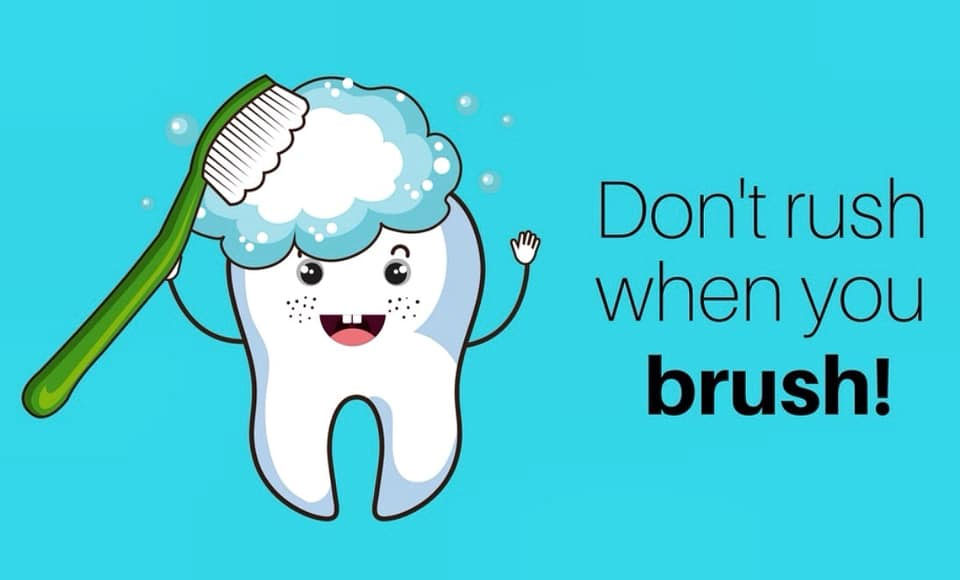Last Updated on July 19, 2023
Short Answer
When brushing your teeth, it’s important not to rush. Taking your time and being thorough is critical to maintaining good oral hygiene. Running through the process can lead to ineffective cleaning and potential dental problems. So, allocate enough time for brushing, at least two minutes, and pay attention to each tooth and every surface. Use gentle, circular motions, and don’t forget to brush your tongue. Remember, a little extra time spent on brushing can go a long way in keeping your teeth healthy and your smile bright.
The importance of taking your time when brushing your teeth cannot be overstated. Rushing through your oral care routine can seriously affect your dental health. It may seem small, but how you brush your teeth can significantly impact your oral health.
When you rush, you are more likely to miss important areas of your mouth, leaving behind plaque and bacteria that can lead to tooth decay and gum disease. Ineffective plaque removal can also lead to tooth sensitivity, making eating or drinking certain foods uncomfortable.
By brushing correctly, you can ensure that you are effectively removing plaque and bacteria, reducing your risk of dental problems. In this article, we will explore the link between rushing and gum disease and provide tips for a more effective brushing routine. Prioritizing oral health by taking time is essential for maintaining a healthy smile.
The Consequences of Rushing Through Your Oral Care Routine
- Rushing through your oral care routine can lead to ineffective plaque removal.
- It increases the risk of developing gum disease
- Rushing can cause tooth sensitivity
Ineffective Plaque Removal
Rushing through your brushing can result in inadequate plaque removal. Plaque is a sticky film that forms on your teeth and contains harmful bacteria. When you run, you may not spend enough time on each tooth, leaving behind plaque that can lead to tooth decay and cavities.
Gum Disease
Rushing through your oral care routine increases the risk of developing gum disease. Gum disease occurs when plaque builds up along the gum line and causes inflammation. If not properly removed, this plaque can harden into tartar, which can only be removed by a dental professional.
Tooth Sensitivity
Rushing can also contribute to tooth sensitivity. You can wear down the protective enamel on your teeth when you brush too quickly or with too much force. This can expose the sensitive dentin underneath, leading to discomfort and pain when consuming hot, cold, or sweet foods and drinks.
By brushing your teeth properly, you can avoid these consequences and maintain optimal oral health.
The Benefits of a Thorough Brushing
When brushing your teeth, slow and steady wins the race. Rushing through your oral care routine can seriously affect your dental health. Brushing your teeth thoroughly has numerous benefits that can help keep your smile bright and healthy.
One of the main benefits of a thorough brushing is effective plaque removal. Plaque is a sticky film of bacteria that forms on your teeth and gums. If not removed properly, it can harden into tartar, leading to tooth decay and gum disease. By taking your time and brushing each tooth carefully, you can ensure that you are removing as much plaque as possible.
Rushing through your brushing routine can also increase your risk of gum disease. Gum disease is a common oral health problem that can cause gum inflammation, bleeding, and tooth loss. When you rush, you may not be able to reach all the areas of your mouth, allowing plaque and bacteria to build up and irritate your gums. By brushing thoroughly, you can reduce your risk of gum disease and maintain healthy gums.
Overall, it is essential to prioritize your oral health by taking your time when brushing your teeth. By brushing thoroughly, you can effectively remove plaque, reduce your risk of gum disease, and maintain a healthy smile.
How Rushing Can Lead to Ineffective Plaque Removal
When it comes to oral care, many people underestimate the importance of brushing their teeth properly. Rushing through the brushing process can lead to ineffective plaque removal, which can seriously affect oral health.
Plaque is a sticky film that forms on the teeth and contains bacteria. If not removed properly, it can harden into tartar, which can only be removed by a dental professional. When you rush through brushing, you may not be able to effectively remove all the plaque from your teeth, leaving behind a breeding ground for bacteria.
Ineffective plaque removal can lead to various oral health issues, including tooth decay and gum disease. The bacteria in plaque produce acids that can erode the enamel of your teeth, leading to cavities. Additionally, plaque can irritate the gums, causing inflammation and eventually leading to gum disease.
Taking time when brushing your teeth is essential to ensure effective plaque removal. Use gentle, circular motions to clean all surfaces of your teeth, including the front, back, and chewing surfaces. Pay special attention to the gumline, as plaque tends to accumulate there. By taking the time to brush correctly, you can prevent the buildup of plaque and maintain optimal oral health.
The Link Between Rushing and Gum Disease
Gum or periodontal disease is a severe oral health condition that can have long-term consequences if left untreated. Rushing through your oral care routine can increase your risk of developing gum disease. Here are some reasons why:
- Inadequate plaque removal: When you rush, you may not spend enough time brushing each tooth and may miss areas where plaque can accumulate. Plaque is a sticky film of bacteria that can lead to gum disease if not removed properly.
- Increased inflammation: Gum disease is characterized by inflammation of the gums. When you rush, you may not brush gently enough, causing irritation and inflammation of the gum tissue.
- Missed signs of gum disease: Taking your time allows you to thoroughly examine your mouth and notice any symptoms of gum disease, such as redness, swelling, or bleeding gums. Rushing can cause you to overlook these essential indicators.
It’s important to remember that gum disease is preventable with proper oral hygiene habits. Taking the time to brush your teeth properly can significantly reduce your risk of developing gum disease and maintain optimal oral health.
The Role of Technique in Achieving Optimal Oral Health
When brushing your teeth, the technique is crucial for optimal oral health. It’s not just about how much time you spend brushing but also how you brush. Using the correct method effectively removes plaque and prevents gum disease.
One important technique to remember is to use gentle, circular motions when brushing. This helps to dislodge plaque and food particles from the teeth and gums. Avoid using a back-and-forth motion, as this can be too harsh on the gums and may cause damage.
Another technique to consider is angling your toothbrush at a 45-degree angle towards the gum line. This allows the bristles to reach the areas where plaque accumulates the most. Be sure to brush all surfaces of your teeth, including the front, back, and chewing surfaces.
Additionally, don’t forget to brush your tongue. Bacteria can accumulate on the tongue, leading to bad breath and other oral health issues. Gently brush your tongue from back to front to remove bacteria or debris.
By using the correct brushing technique, you can ensure that you are effectively removing plaque and maintaining optimal oral health. Take your time and be mindful of your plan for a healthier smile.
The Impact of Rushing on Tooth Sensitivity
Rushing through your oral care routine can hurt your tooth sensitivity. Tooth sensitivity occurs when the protective layer of enamel on your teeth wears down, exposing the sensitive dentin underneath. This can lead to discomfort or pain when consuming hot, cold, or sweet foods and beverages.
When you rush through brushing your teeth, you may not give them the proper attention they need. This can result in inadequate plaque removal, contributing to enamel erosion and tooth sensitivity. Additionally, rushing can lead to brushing too hard or using a toothbrush with stiff bristles, which can cause enamel abrasion and increase tooth sensitivity.
By taking the time to brush correctly, you can help protect your tooth enamel and reduce the risk of tooth sensitivity. Use a soft-bristled toothbrush and gentle, circular motions to clean your teeth. Avoid brushing too aggressively or for too short of a time. Remember, thorough and gentle brushing is critical to maintaining optimal oral health and preventing tooth sensitivity.
Investing in Your Oral Health for a Lifetime of Smiles
When it comes to maintaining a healthy smile, there is no room for rushing. Taking the time to brush your teeth properly is essential for optimal oral health. Running through your oral care routine can have serious consequences, including ineffective plaque removal and an increased risk of gum disease. By prioritizing your oral health and dedicating the necessary time to your brushing routine, you can ensure that your teeth and gums stay healthy for years.
One of the critical benefits of thorough brushing is the removal of plaque. Plaque is a sticky film that forms on your teeth, leading to tooth decay and gum disease if not properly removed. Rushing through your brushing routine can leave behind the plaque, allowing it to build up and cause damage to your teeth and gums.
Furthermore, rushing can also contribute to tooth sensitivity. Brushing too quickly or with too much force can wear down the protective enamel on your teeth, exposing the sensitive dentin underneath. This can lead to discomfort and pain when consuming hot or cold foods and beverages.
By brushing correctly and using the correct technique, you can effectively remove plaque, reduce your risk of gum disease, and maintain a healthy smile. Investing in oral health will pay off in the long run, ensuring a lifetime of smiles.
Frequently Asked Questions
Q: Why is it important to take time to brush your teeth?
Taking your time when brushing your teeth ensures that you thoroughly clean all surfaces of your teeth and remove plaque effectively.
Q: What are the consequences of rushing through your oral care routine?
Rushing through your oral care routine can lead to ineffective plaque removal, increased risk of gum disease, and tooth sensitivity.
Q: How does rushing lead to ineffective plaque removal?
When you rush, you may not spend enough time on each tooth, leaving behind plaque that can lead to tooth decay and cavities.
Q: Is there a link between rushing and gum disease?
Yes, rushing through brushing can increase the risk of gum disease as plaque buildup can irritate and inflame the gums.
Q: What are some tips for a more effective brushing routine?
Some tips for a more effective brushing routine include using a soft-bristled toothbrush, brushing for at least two minutes, and using proper technique.
Q: How does technique play a role in achieving optimal oral health?
Using the correct brushing technique helps ensure that all areas of your mouth are correctly cleaned, reducing the risk of oral health issues.
Q: Does rushing impact tooth sensitivity?
Yes, rushing through brushing can lead to tooth sensitivity as it can cause enamel erosion and expose the sensitive dentin layer of the teeth.
Q: Why should we prioritize our oral health by taking our time?
Prioritizing our oral health by taking our time when brushing helps prevent dental problems, maintain a healthy smile, and avoid costly dental treatments.
About The Author

Pat Rowse is a thinker. He loves delving into Twitter to find the latest scholarly debates and then analyzing them from every possible perspective. He's an introvert who really enjoys spending time alone reading about history and influential people. Pat also has a deep love of the internet and all things digital; she considers himself an amateur internet maven. When he's not buried in a book or online, he can be found hardcore analyzing anything and everything that comes his way.

